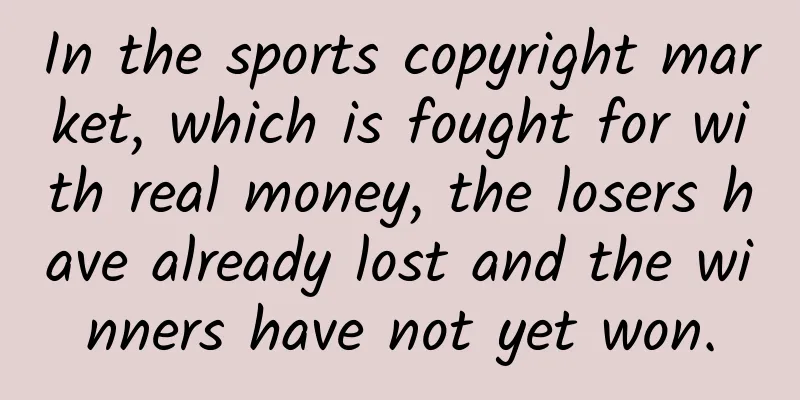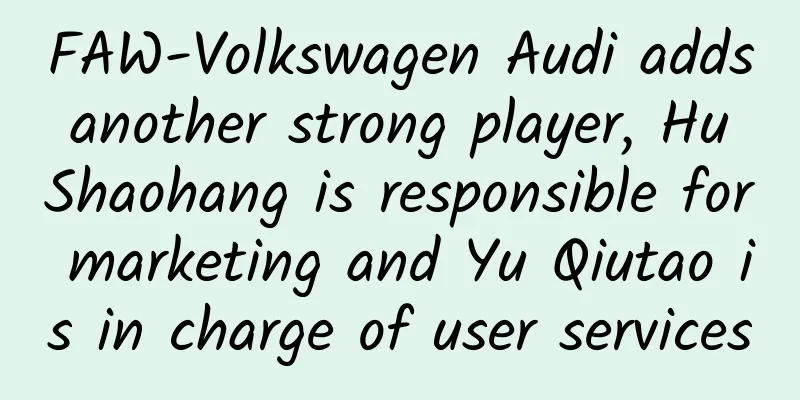In the sports copyright market, which is fought for with real money, the losers have already lost and the winners have not yet won.

|
Two years ago, Zhao Jun, general manager of Ti Ao Power, attended the bidding meeting for the production and copyright of the Chinese Super League signals. She had three envelopes in her pocket, with 7 billion yuan, 8 billion yuan and 9.5 billion yuan written on them respectively. At the final bidding stage, she opened the one with 8 billion yuan written on it. This figure "crushed" CCTV, which bid 4 billion yuan, and Five Star Sports, which bid 4.3 billion yuan. The next day, the outside world gave Zhao Jun the nickname "Eight Billion Sister". With a shocking bid of RMB 8 billion, Ti Ao Power acquired the exclusive 5-year copyright of the Chinese Super League. This scene was just one of the bloody battles for Chinese sports copyright in the past three years. The battlefield will become even more brutal until someone falls. All players gradually realized that spending money to buy copyrights regardless of cost was just a blind adventure. After all, this is a business that focuses on making money. After the brilliant fireworks, LeTV Sports collapsed, and the domino effect it triggered also changed the landscape of Chinese sports copyrights. Today, trapped by the new policy of the Football Association and operational pressure, Ti Ao Dongli is seeking to extend the copyright of the Chinese Super League from 5 years to 10 years, and at the same time took over the advertising business of Suning Juli Sports; Suning, which has acquired almost all football copyrights at a high price, has found Dangdai Mingcheng (SH.600136) and Xinying to establish a joint venture company to distribute the copyrights in its hands in order to digest the copyright costs; Xinying Sports, whose Premier League copyright was taken away by Suning, is planning to inject the listed company Dangdai Mingcheng to survive... "The current situation is that you are in me and I am in you. It seems to be a competitive relationship, but after the fierce competition, the way out still needs to be found from each other. This situation will continue for a long time. The value of copyright will eventually be reflected through media platforms." Zhao Jun told Tencent Finance "Feature Film". Right now, after all the copyrights of top sports events have been sold, there are only two major copyrights, CBA and Champions League, waiting for their buyers in the market. In the absence of LeTV Sports, there are only two large new media platforms, Tencent Sports and Suning Juli Sports, left. The two major copyrights that caught up with the market downturn are in an awkward situation. Tencent Finance's "Main Film" learned that the CBA copyright, which was once expected to sell for 1 billion US dollars (about 6.6 billion RMB) for 5 years, may only be sold for 200 million RMB per year. And the Champions League copyright, which was offered for 380 million euros for 3 years, is still floating in the market and no one claims it, as the funds are difficult to leave the country and buyers are unable to digest it. In just three years, its rise was rapid and its fall was sudden. The story of Chinese sports copyright has begun to be told anew. Fight with fists until LeTV Sports falls "The copyright fee for the Chinese Super League in the 2014-15 season was only 8 million, plus labor costs it was only 15 million. At that time we could get 35 million in advertising. If the Chinese Super League copyright was 30 million, we would have bought it without a second thought. If it was 50 million, we would have bought it. But if it reached 500 million or 1 billion, it is not a commercial consideration at all. There is no chance of any return, which is very dangerous." Wei Jianglei, who was appointed to take over Sina Sports business in early 2015, described the tragic scene at the time. However, the market has never lacked aggressive players, such as LeTV Sports, which had just been established for less than three years at the time. Born at the right time, LeTV Sports showed its ambition for copyrights of top events, and it harvested as many as 310 copyrights, 72% of which were exclusive, including copyrights of top events such as the Chinese Super League, Asian Champions League, Top 12, Champions League, Premier League, Bundesliga, Serie A, Ligue 1, ATP, CBA, etc., as well as niche events such as golf, fighting, and racing. The operator who helped LeTV Sports acquire the above-mentioned copyrights was Yu Hang, who jumped from Sina Sports at the end of 2014. Two years later, when reviewing the original copyright strategy, Yu Hang told Tencent Finance's "Feature Film" that in the sports industry, a relatively easy-to-achieve explicit indicator is to establish one's own brand in the sports media field. When LeTV Sports first entered the market, it was impossible to buy foreign IPs like Wanda did, and the top copyrights also had their own owners, so it started by focusing on smaller blue ocean event areas and bought a bunch of copyrights such as bicycles, baseball, and golf to form a quantitative scale, and then compete for the top copyrights. It has to be admitted that the copyright story has won the favor of capital. With the massive acquisition of copyrights, LeTV Sports' financing scale and valuation have also risen. Before the B round of financing in 2016, the company had just obtained the copyright of the Chinese Super League for two years. It originally planned to raise 3 billion yuan, but in the end it easily got 8 billion yuan, with a post-financing valuation of 21.5 billion yuan, which was more than 7 times higher than the A round of financing 11 months ago. At that time, the entire sports industry was intoxicated by the "State Council Document No. 46" which was hailed as "a historic breakthrough for China's sports industry". The market size of 5 trillion yuan in 2025 stimulated the rich imagination of capital. This was especially true for sports copyrights - "relaxing restrictions on event broadcasting rights. Except for the Olympic Games, Asian Games, and World Cup, all other domestic and foreign sports events can be directly purchased or transferred by various TV stations." Previously, the value of copyrights of major events had been suppressed by the long-term monopoly of CCTV, the national TV station. Top sports copyrights are equivalent to the entry ticket to this crazy game. The copyright price is like a wild horse running out of control. The two core players in this battle, LeTV and Suning, are also exchanging positions in the game. At that time, the top copyrights belonged to different companies. LeTV successively snatched the copyrights of AFC, CBA, Serie A and Ligue 1, New England held the copyright of the Premier League, and NBA and other resources belonged to Tencent Sports. Suning, which was forced to the edge of the cliff, made a desperate bet and grabbed the life-saving straw of the 5-year exclusive copyright of La Liga at a sky-high price of 250 million euros. One detail is enough to prove how fierce the competition between Suning and LeTV is. On August 17, 2016, LeTV Sports CEO Lei Zhenjian, Yu Hang and other senior executives hinted in their WeChat Moments that they would "unprecedentedly gather all the 'five major European leagues'". But the next day, Suning suddenly changed its mind and decided not to distribute to LeTV Sports and continue to broadcast La Liga exclusively. Although its operation of La Liga was not effective and it was under great operating pressure. Lanxiong Sports quoted Zhou Liang, the former general manager of PPTV Sports, as saying that "PPTV was under pressure from Suning's senior management, and the senior management felt embarrassed". The most intense moment of the fight for copyright has arrived. In November 2016, Suning spent US$721 million to acquire the three-year copyright of the Premier League, which directly led to the collapse of New England's dream of listing on the Hong Kong stock market through the shell of Chuanxin Group. "Suning's acquisition of the Premier League means that the entire market competition for copyrights has come to an end. Everyone knows that we can no longer compete like this," said a sports executive who has participated in copyright negotiations many times. At that time, LeTV's first season operating the Chinese Super League had just ended. From a business logic perspective, this season was undoubtedly a failure - the Chinese Super League copyright cost 1.35 billion yuan, but only 50 million yuan was invested, a loss of 1.3 billion yuan a year. Sun Hongbin, the later controller of LeTV, even bluntly rebuked "You are crazy for doing this." LeTV Sports gradually showed signs of fatigue. After nearly half of its Series B financing (about 4 billion yuan) was borrowed by Jia Yueting, it lost the Chinese Super League and the Asian Football Confederation due to its inability to pay for copyrights. Although LeTV Sports wanted to continue broadcasting the Chinese Super League, even if it distributed the copyrights, a person close to LeTV Sports executives told Tencent Finance's "Feature Film" that "the executives went to Jia Yueting to discuss buying the Chinese Super League, and were almost kicked out of the office by Jia Yueting in the end." The copyright landscape is changing rapidly. Around March 2017, Suning took the copyright of the Chinese Super League and Asian Football Confederation events from Ti Ao. At that time, Zhao Jun told Tencent Finance's "Feature Film": "This gave Suning a golden opportunity. Getting these two copyrights means that the football foundation is in place, which has strategic significance. If we miss such an opportunity this year, there will never be such an opportunity again. This decisive decision is a brave act and it is also very fulfilling for Suning." Although it was never officially announced, in April of the following year, the copyright of the Bundesliga for five seasons was also acquired by Suning for more than 250 million US dollars. At this point, after the collapse of LeTV Sports, Suning has unified the top football copyrights at home and abroad, and together with Tencent Sports, which almost monopolized basketball copyrights, they have become the only two major sports new media platforms in the copyright market. After experiencing the ups and downs of the copyright market, the biggest suspense is how much the CBA and the Champions League can sell for? After the chaos, the Three Kingdoms are now fighting for supremacy. On the evening of July 18, 2017, Zhang Jindong, chairman of Suning Holdings Group, who was on a business trip in Washington, D.C., did not attend the welcome dinner of the 2017 China-U.S. Entrepreneurs Summit and flew back to China in advance. That night, on CCTV's "News 1+1" program hosted by Bai Yansong, an expert from the Chinese Academy of Social Sciences said that some companies' irrational overseas investments were "essentially a transfer of assets," and the program happened to mention Suning's 270 million euro stake in Inter Milan Football Club. Major buyers in China's sports copyright market have undergone four rounds of reshuffles Although it was later proved to be an accidental injury, Suning's large-scale maneuvers in the sports industry still raise questions about how the sports industry can enhance its main retail business and even develop in synergy with the financial, investment, cultural and creative, and real estate sectors. In this regard, Suning did not respond to Tencent Finance's "Main Film" inquiry. "Suning is sitting on the edge of a volcano." The above-mentioned sports industry person expressed concern. The person analyzed in Tencent Finance's "Main Film" that Juli Sports will have to invest nearly 20 billion yuan in operating copyrights over the past five years. There should be no problem with the funding level, after all, it has the support of Suning. "After five years, at least 5 or 6 billion will be lost. What output can it bring in the end? Can a paid market incubated by losing money be formed? If there is no hope of making money by then, the copyright price may increase to 40 billion in the next cycle. What should you do then?" At Suning's strategic launch conference in early 2017, Zhang Jindong said that in the fields of cultural creativity, sports, video business and football club operations, no independent profit model has been formed in China. A senior person close to Suning told Tencent Finance's "Feature Film" that after Suning's cloud business stabilized, Zhang Jindong invested more energy in the sports business. "Now I often go to PPTV's official website to watch games, all kinds of sports, and sometimes I will call directly to ask if I am not satisfied with the studio effect. In fact, Suning has begun to carry out a series of changes inside and outside the company. As far as the media content line is concerned, PPTV Juli Sports has been split from the Cultural and Creative Group to the newly established Sports Group, which is managed by Suning Group's CMO Bu Yang. Zeng Gang is the actual person in charge, and the advertising investment business of Juli Sports' entire platform is under the charge of Zhang Peng, vice president of Ti Ao Power. Tencent Finance's "Main Film" learned that the long-delayed Suning Sports Resources Promotion Conference will be held in October this year. In addition to Suning taking over the Chinese Super League and Asian Football Confederation copyrights held by Ti Ao Power, Suning is also negotiating with Ti Ao's major shareholder China Media Capital to buy out its 56% stake and lock in Chinese football copyright resources for a long time. However, the deal has not yet been completed. Zhao Jun told Tencent Finance that the most important thing for the company at this stage is to communicate with the Football Association on how to operate the Chinese Super League copyright in a long-term and sustainable manner. At the same time, the company is also trying its best to help media platforms realize their copyrights. "If we don't find ways to help media platforms make money now, our business will not be easy in the future." Having a single sports copyright can certainly attract users, but it is a huge pressure in terms of commercial realization. To this end, Suning also established a joint venture with Contemporary Amperex Technology Co., Ltd., intending to inject all its European football copyrights into the joint venture at a 20% discount, and Xinying Sports will distribute the copyrights, provided that Juli Sports' broadcasting rights are given priority. However, what puzzles the market is that after LeTV Sports withdrew from the competition for the sky-high copyright, there are only two new media platforms left in the sports copyright arena, namely Suning and Tencent. It is questionable how much interest Tencent, which has always been cautious and rational, has in football copyright. Tencent Finance learned that Suning Juli Sports has begun to experiment with a membership payment model, with its app downloads exceeding 10 million. After recently signing several large advertising contracts, it has given Suning's internal employees great confidence. Apart from Suning, Tencent Sports, which signed exclusive basketball copyrights such as NBA and FIBA in the early stage of copyright competition, has not followed up with any high-priced copyrights in the past two years, but has been deepening its IP operations. Currently, among the many copyrights, only the NBA event copyright can achieve a break-even, while other copyrights are all loss-making. "Tencent has signed a lot of copyrights recently, which is quite regretful for us. We should have participated because overall, the copyright prices are now much lower than the peak, with a difference of 3 to 5 times," said Wei Jianglei. In addition to monopolizing all exclusive basketball copyrights except the CBA, Tencent is also not to be outdone in international football copyright resources, with the UEFA Champions League, Premier League, Serie A, and Ligue 1 in its hands. It also has exclusive copyrights to the four major North American professional sports leagues: NBA, NHL, NFL, as well as the French Open, Wimbledon, and US Open. In comparison, Tencent Sports is undoubtedly the new media platform with the richest copyrights in the market. In this regard, Tencent Sports Operations General Manager Zhao Guochen said that many copyright holders were late to the Chinese market and had high expectations, but now the Chinese sports market has returned to rationality, and they need to be told that it is not as good as they imagined. The sports industry is not achieved overnight, it is accumulated slowly, just like the event IP, it also needs to be cultivated. "It is not a harvest now. If the price is reasonable, buy it, if it is not reasonable, don't buy it. It is purely a business logic. Of course, it is best to have it, but if not, wait a little longer. Zhang Zhiyong, who once served as the president of LeTV Sports, commented that Tencent Sports is most likely to become the most powerful entrant into the sports media industry. This is determined by consumer trends and the company's genes, and cannot be influenced by humans. One force that cannot be ignored is that Dangdai Mingcheng has a lot of strength. After owning the upstream clubs, midstream venues + brokerage + marketing, the acquisition of Xinying Sports will make up for Dangdai Mingcheng's shortcomings in the sports industry content platform, and the cooperation with Suning's copyright distribution also makes this acquisition full of imagination. A senior expert in sports copyright believes that since Suning focuses on football copyrights and Tencent has secured all basketball resources, sports media will still be an oligopoly game in the future and it is not impossible for one company to dominate the market. If the company finds that it can make money after monopolizing the market, temporarily absent platform players such as Youku, iQiyi, Sina and Baofeng may also come to the table. "Whether this business succeeds or not is a matter of the next three to five years. By then the copyrights will have expired and at least we'll be able to see a clearer business outline," he told Tencent Finance's "Feature Film". Whoever buys it will lose money. What is the logic behind buying copyright? "Sports businesses are small matters. If they succeed, they will not make Baofeng succeed. If they fail, they will not make Baofeng fail." Feng Xin, CEO of Baofeng Group, believes that whether or not to own copyrights is not fatal, because the input-output ratio is too poor. Zhang Dazhong, CEO of Ali Sports, directly said, "I will not buy copyrights at sky-high prices." A senior executive of a sports company responsible for the commercialization of copyrights told Tencent Finance's "Feature Film" that he had strongly opposed the company spending money to buy a certain copyright, but out of consideration of its strategic value, it eventually bought it, despite a huge loss in the end. The price of sports copyrights in the Chinese market is returning to rationality, and its future value remains to be explored. Lei Zhenjian also told Tencent Finance's "Main Film" that he had done many simulations. If the existing sports new media landscape remains unchanged and media costs remain unchanged, even if the company does its best, new media will always be a business line with a negative 20% gross profit margin. "If the business model does not change qualitatively, this concept will always hold true, which means that no matter how the media business is done, it will be a loss-making business." Take the three-year exclusive Premier League copyright that Suning bought for US$721 million as an example. The annual cost is about RMB 1.5 billion. Wei Jianglei once estimated that "all advertising revenue from the sale of Premier League live videos will not exceed RMB 500 million." However, for media platforms, not having top copyrights means losing a large number of users, which is equivalent to directly withdrawing from the gold rush of digging for wealth. More importantly, each company is now also using exclusive content rights to expand into the upstream of the sports industry. For example, Tencent Sports has begun to try event sponsorship, self-made events, and sports brokerage business, including the Super Penguin Basketball Celebrity Game, the National Table Tennis World's Strongest 12-A-Sports Game, and the exclusive commercial operation rights of the Chinese Women's Volleyball Team. From the perspective of the capital market, the above-mentioned sports company executive also provided an idea - "A listed company buys sports copyrights for 1 billion and loses 500 million, but the return in the capital market exceeds 5 billion. How do you think this account should be calculated?" However, for now, if we consider it purely from the perspective of commercial monetization, at a time when it is difficult to break the ice on the TO C side of membership payment, the business models for sports event copyright operations only have two types: copyright distribution and advertising investment. Finding more monetization models has become a common concern in the industry. "In 2016, a big year for sports, the total share of sports advertising was about 8 billion yuan, of which TV media represented by CCTV-5 received at least half, and the remaining 3 billion yuan was divided up by various new media. The current domestic sports sponsorship market is 20 billion yuan, and entertainment IP has absorbed a large amount of the budget." Ding Mingrui, deputy general manager of Tencent Sports, once publicly stated. Public data shows that "Running Man 4" has a commercial sponsorship income of up to 2 billion yuan in one season, while the Chinese Super League and CBA only have 500-700 million yuan. Ding Mingrui introduced that the dimensions of commercial evaluation of the event value are mainly traffic and advertising. From data such as PV (page views), interactive operations, and video playbacks, the saleable inventory - CPM (cost per thousand impressions) is calculated. In addition, the volume of a certain event in the Chinese market is calculated. Based on its increasing pattern and the forecast of the growth rate of this customer group, the scale of advertising by advertisers and event sponsors is calculated. Now it is a more comprehensive decision-making plan. In reality, what worries new media platforms is that CCTV and local TV stations broadcast many events for free, which directly attracts a large number of potential paying users. LeTV Sports Co-President Liu Jianhong once publicly complained, "We have raised the copyright to a sky-high price, so the product should conform to commercial logic. I think there should not be so many TV stations broadcasting the Chinese Super League for free. This is the biggest damage to the commercial value of the Chinese Super League." Zhao Jun, who has been deeply involved in Chinese football copyright for many years, felt deeply touched. She told Tencent Finance's "Main Film" that the current business situation of local TV stations has deteriorated seriously. Because the signal production level does not meet the requirements for broadcasting games, they have to pay for it. Local TV stations not only do not pay, but also want to get the so-called "screen occupation fee". "More than 20 local TV stations have to subsidize the broadcast of their own team's games. How can those new media that have spent more than one billion make money and market themselves." The bad habit of pirated broadcasting in the industry is also rampant. Just this week, Ti Ao Power announced that it had completed the notarization and preservation procedures for the infringement and pirated broadcasting of the top 12 games by Dongqiudi, Migu Live and other platforms, and will formally initiate litigation in the next step. It said, "The pirated broadcasting behavior of the infringers without paying a penny seriously damaged the legitimate rights and interests of the event copyright operator, not only causing direct economic losses, but also destroying the competitive order of the sports event licensing market." Liu Xiao, vice president of Qianjun Sports, who has been engaged in macro policy research and investment for a long time, believes that sports copyright can be analyzed as an asset. "LeEco invested 1.35 billion in the Chinese Super League, with a revenue of 50 million and a price-to-sales ratio of 26 times. This is a big bubble. If Suning takes over and can increase revenue from 50 million to 200 million, it will be almost 6 times the price-to-sales ratio. This is much more rational and acceptable." In Liu Xiao's view, the operation of sports copyright is to realize asset appreciation. Factors affecting the value of copyright include event brand, audience size and communication strength. The core event brand includes the competition system, event credibility, competitive level and the personal brand of participating athletes. After layer-by-layer analysis, it is found that copyright operators (such as various media platforms) can only control the dimension of communication strength. The more important event brand is beyond their control and can only be indirectly influenced through negotiations and agreements. Li Yidong, chairman of Ti Ao Power, also told Lanba Sports that "8 billion (for the Chinese Super League) is a forward-looking dynamic valuation. If the entire system does not keep up, the market-oriented operating company will inevitably face the dilemma of advancing alone and being unable to make a difference." As a winner of Toutiao's Qingyun Plan and Baijiahao's Bai+ Plan, the 2019 Baidu Digital Author of the Year, the Baijiahao's Most Popular Author in the Technology Field, the 2019 Sogou Technology and Culture Author, and the 2021 Baijiahao Quarterly Influential Creator, he has won many awards, including the 2013 Sohu Best Industry Media Person, the 2015 China New Media Entrepreneurship Competition Beijing Third Place, the 2015 Guangmang Experience Award, the 2015 China New Media Entrepreneurship Competition Finals Third Place, and the 2018 Baidu Dynamic Annual Powerful Celebrity. |
<<: Tesla delivered 88,400 vehicles in Q1 2020, of which 76,200 were Model 3 and Model Y
Recommend
Why are programmers a little weird?
[[163850]] I have been a programmer for n years a...
A complete summary of the offline event planning process!
For advertisers, offline event planning is no str...
If large carnivores become extinct, will ecosystems inevitably collapse?
Produced by: Science Popularization China Author:...
From 0 to 1, how to obtain seed users?
Product operation from 0 to 1: A series of articl...
How to implement and operate Juliang Qianchuan’s “Extreme Speed Promotion”?
If you want to get more traffic when selling good...
What are the factors that drive app user growth? This article is very sharp.
Today, as mobile Internet has penetrated into eve...
The average human life expectancy will be at least 108 years in 2030! How can we make the most of our increasingly long second half of life?
Living longer and healthier seems to be the commo...
Are You a “Cancer Candidate”?
Many people are scared when they hear the word &q...
The story of the builders of Baihetan Hydropower Station: a decade of hard work
The world-renowned Baihetan Hydropower Station pr...
The road to App componentization/modularization - building a development architecture idea
App componentization/modular development architec...
How can Toutiao quickly gain millions of followers? Here are 10 effective routines
With the rise and prosperity of the mobile Intern...
The first lesson of money freedom: "Wallet" management, money management system and methods
The first lesson of money freedom: "Wallet&q...
Wedding photography industry, Mayu APP promotion and distribution skills!
With the arrival of summer, the wedding photograp...
This boy band disbanded, not because of their mediocre singing, but because...
There are few insects whose names are often unkno...
Want to increase followers on Douyin quickly? Please accept the super powerful complete guide to operating Douyin!
Currently, people who use TikTok have two main pu...









